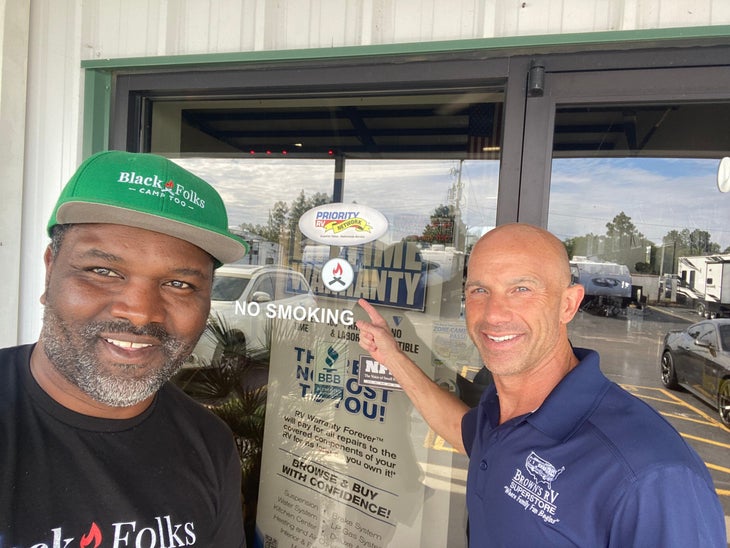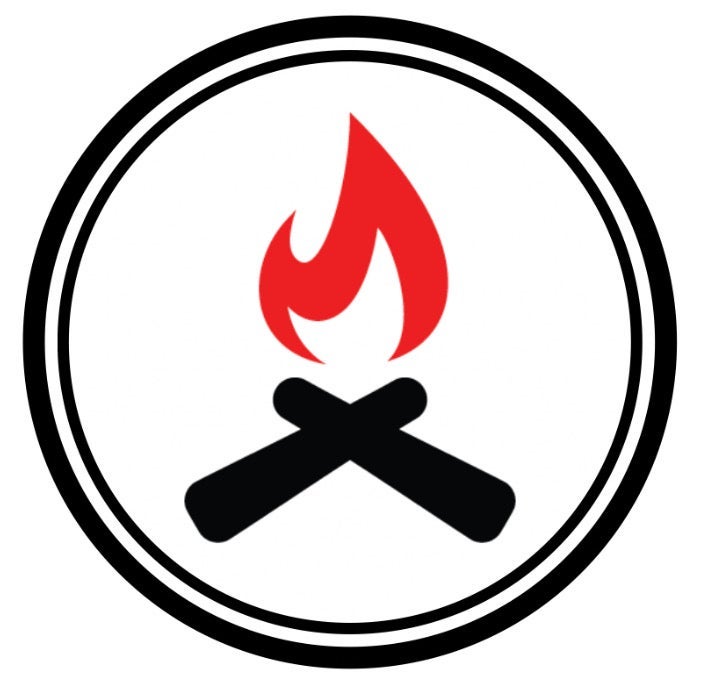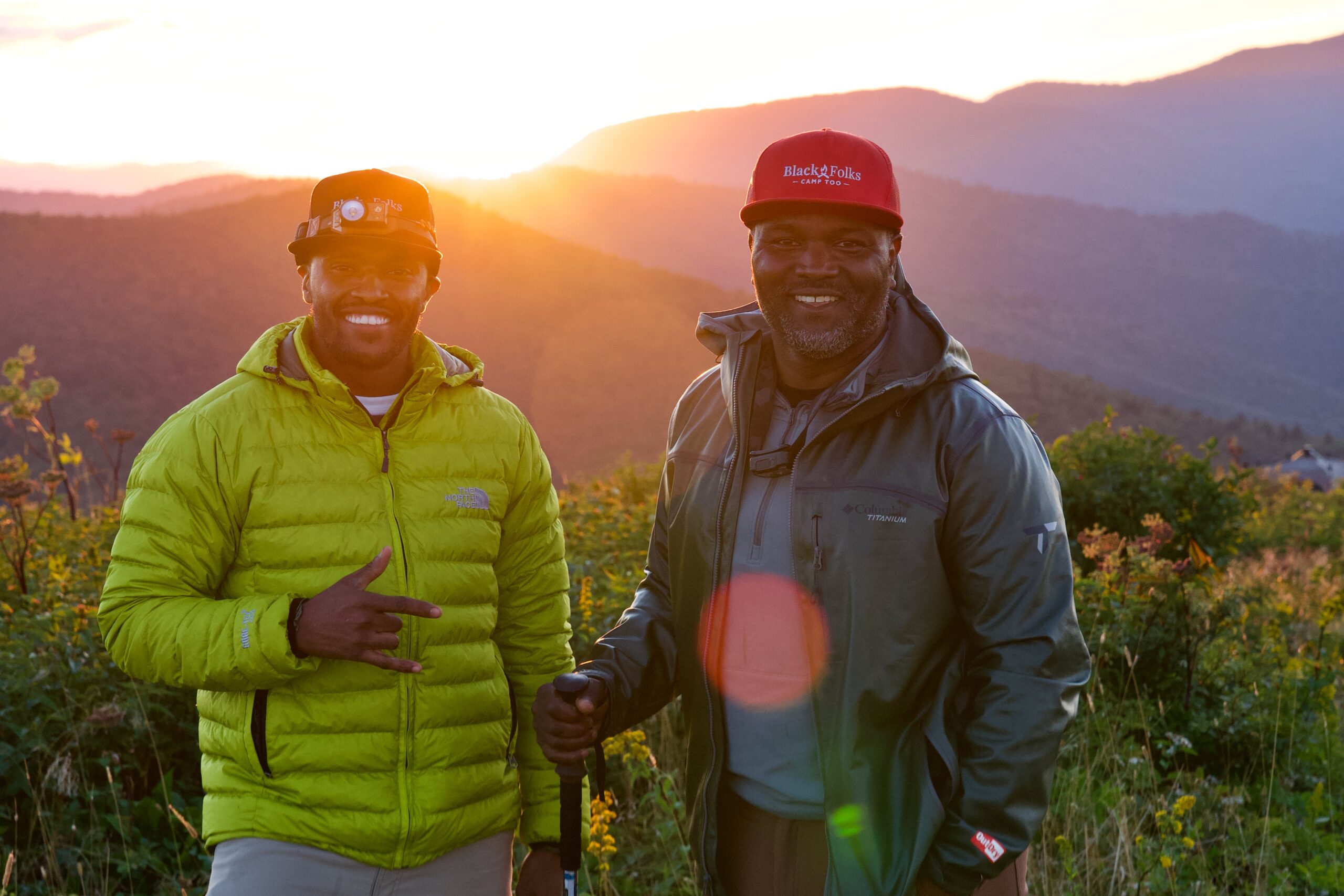Before Earl B. Hunter Jr. founded his marketing and consulting company Black Folks Camp Too, he was vice president of sales at SylvanSport—a business based in Brevard, North Carolina, known for its ultralight trailers. He was often on the road for his job, traveling all over the country. In 2017, he journeyed 14,000 miles through 20 states with his seven-year-old son, staying in 49 campgrounds along the way. Throughout the entire trip, he saw only one other Black family.
“That experience really drove me to start Black Folks Camp Too, because I saw the outdoors for what it could be,” said Hunter. “I knew right then that it was time for some improvement.”
Hunter’s business experience made him keenly aware of the lack of Black folks working in the outdoor industry. His time spent traveling, particularly in our national parks, also showed him that Black folks largely hadn’t embraced the outdoor lifestyle. As a sales guy, he saw this as a huge missed opportunity.
In October 2019, Hunter announced the launch of Black Folks Camp Too at the Outdoor Economy Conference, where he presided as master of ceremonies speaking to a primarily white audience. He made an appeal for the business case of his idea: Black folks spend $1.2 trillion a year, virtually none of it in the outdoor industry. He wrapped up his presentation by singing Sam Cooke’s “A Change Gonna Come.”
How can companies start tapping into that untapped that market? We spoke with Hunter about his unique value proposition: helping outdoor brands support DEI efforts and diversify in a way that’s tangible, authentic, long-lasting, and profitable.
If you could sum up your mission statement in a sentence, what would it be?
At Black Folks Camp Too, we remove fear, we add knowledge, and we invite more Black folks to camp and join the outdoor lifestyle.
Now that your organization is a year old, how is it filling the gap you observed in the outdoor industry?
We’re not a group or a club—we’re a dot-com company. For us, I saw two opportunities. One, to be able to educate people of color. We have a digital education portal for Black folks wanting to explore the outdoors, whether they want to go backpacking, car camping, or RVing. We drive information on how to do that. The second thing is, I’m not a “kumbaya” guy at all, I’m an ROI guy, and I saw a huge potential here. You don’t have to hug me and tell me how bad things are in the outdoor industry in regards to people of color. What I would like you to do is jump in and help me, so we can help you make money.
The more Black folks or people of color who learn about the outdoor industry and want to participate in it, the more they will buy the products. I know that’s true because you see it in every other industry. You learn the industry, you love the industry, and you become loyal to the industry.
As a company, what do you offer your clients?
We’re a marketing and consulting firm and right now. We’ve partnered with a ton of companies, and also with the state of South Carolina. What we do primarily is build content, particularly from trips we run in the Southeast. The diverse content we’re currently seeing from the outdoor industry is of Black folks camping and backpacking all over these beautiful places in the United States, but rarely is that content in the Southeast. I believe that if we get the Southeast right in regards to Black folks and our fears of the outdoors, and we affirm it all over the country, then we’ll really see a change in the way we think, the way we see things, and the way we are in the outdoors. As a company, we’re creating this change through our content, educational videos, and by working with state partners to help drive messaging on removing fear, adding knowledge, and inviting more people in.
Why have you focused your efforts in the Southeast?
Black folks who live in the Southeast are totally different from Black folks who live in the West or the North because of the shared history. In the South, some of the most heinous things that have happened to us were in the woods. My great-grandmother would tell my grandmother, who’d tell my mother, “Look you need to stay out of those woods” because of some of the lynchings and cross burnings they saw when they were young. Who would want to tell their offspring to go in the woods after seeing things of that nature? As a company, though, we’re not focusing on the things that have happened, but rather how we can collectively move past that trauma and get more Black folks in the outdoors.
What impact are you seeing from your marketing campaigns and the trips you run?
Marketing plays a huge role. Right now, our channels are all on overload with people asking questions, letting go of fear, and being able to visualize themselves in some of these outdoor spaces. On our trips, we’re taking people into the mountains who have never been outside of their comfort zone, who have never camped. We get Black folks crying on mountains when they see waterfalls, particularly when I tell them they’ve been paying for these beautiful places all their lives.
One of the biggest reasons it’s important to get people of color and Black folks outdoors is that it leads to more people who love the outdoors, and thus more people who will care for these beautiful places. We need people caring for the outdoors, simple as that, or else we won’t have it. Our job is to make sure Black folks follow the Leave No Trace principles and to make sure we adopt those when we go outdoors.
I love that as a company you embrace the RV segment of the outdoor population. We don’t usually see that in the DEI space. Can you talk a bit about that choice?
We’re creatures of habit. There are a lot of Black folks who want to love camping, who want to climb these mountains, but I believe the RV industry is a good entry point for others who aren’t there yet. You still have the comforts of a bed and other amenities, but you also have an opportunity to go to different places. The RV industry is also a safety point. For Black folks afraid to go in the woods, an RV gives them a different way to camp and feel secure.
From an educational standpoint, though, we need to help Black folks learn how to finance these RV units. We need to help them feel confident enough to go to an RV dealer, engage, and make sure they’re getting the best information. We need to educate the dealers as well. Just like we’re educating consumers, we need to educate the industry. Before you can sell your product, you need to understand why Black folks haven’t bought it before. Once you understand that why, you’ll know how to market and sell to us.
Right now, the time is definitely ripe for industry-wide change. How do you keep your marketing authentic in a climate where everyone is scrambling to come out on the right side of things?
I don’t sugarcoat anything. My job is not to make you feel good about what’s going on. My job is to make you feel uncomfortable in a respectful way so we can change things. The bottom line is that we cannot continue to operate the way we have been in our industry. We can’t say the outdoors are for everyone because everyone hasn’t been welcome. We can’t say that everyone is invited because everyone hasn’t been invited.
Can you elaborate on the importance of inviting people into the industry?
The outdoor industry needs to be yelling, “Come on Black folks! We want you in our national parks, we want you in our state parks! We want you to buy our gear and we want to make gear that supports you. We want to understand why you don’t go outdoors and we want to move forward to show you that we care.”
Your new co-branding initiative is a really tangible way to do that yelling, right? Let’s hear about it.
Yes, we’re beginning to co-brand with companies who really want to get serious about inviting more people of color to the outdoors. Companies can jump on board with our mission by co-branding with our campfire logo, which is a powerful symbol of unity in the outdoors, representing a place where we can all sit down and begin to have some of those hard conversations.

Just like how blazes on trails guide us along, when people see this campfire blazing on a piece of gear or the door of an outdoor shop, they will know that everyone is welcome. Companies can also partner with us and support us, committing a percentage of profits to our cause. But by incorporating our logo onto their gear, they are directly supporting our mission of removing fear, adding knowledge, and inviting more Black folks to camp. Right now, a few RV companies have already adopted our brand, and Diamond Brand Gear, out of Fletcher, North Carolina, has agreed to co-brand their tents with our unity symbol. A percentage of profits come back to Black Folks Camp Too. Individuals can also rock the logo in the form of stickers and patches.

Can you talk more about why you chose the campfire as your logo?
We believe the campfire is the portal to amazing conversations, regardless of race, age, or gender. Everyone has something to say. Right now, 90 percent of the people around the campfire are white. If we start getting more people of color around that campfire we’ll start having conversations about the things that are causing our country unrest right now.
Black Folks Camp Too wasn’t created just to get Black folks to camp with Black folks. That would just perpetuate what the industry already looks like. Black Folks Camp Too was built to encourage and invite more Black folks to camp with anybody and everybody.
We believe the campfire is the unity symbol of the outdoors. Companies love what we do because we don’t isolate anyone. We don’t shun anyone. We don’t care what you look like. We want you around that campfire—just as long as there are some Black folks around it, too.


